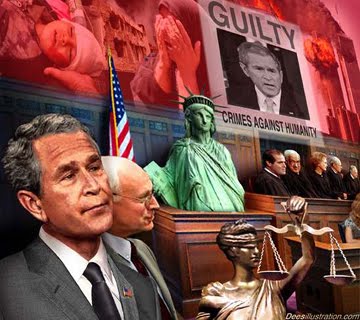FREE: STAMP OUT THE O'DONNELL NONSENSE
Wednesday, September 29, 2010
Tuesday, September 28, 2010
Liberal Groups Planning To Rally On National Mall : As The News Becomes Increasingly Grim.
Talk Radio Host Claims Dick Cheney Was Responsible For 9/11
By ATS
Talk Radio Host Claims Dick Cheney Was Responsible For 9/11. By. ATS. – September 28, 2010. 9/11 Blogger. 9/27/10. No Comments. Start the ball rolling by posting a comment on this article! Leave a Reply. Name (required) ...
America 20XY - http://america20xy.com/blog6/
By ATS
Talk Radio Host Claims Dick Cheney Was Responsible For 9/11. By. ATS. – September 28, 2010. 9/11 Blogger. 9/27/10. No Comments. Start the ball rolling by posting a comment on this article! Leave a Reply. Name (required) ...
America 20XY - http://america20xy.com/blog6/
Jennifer Glasse | London28 September 2010
The British government says it plans to introduce legislation to change the process for getting an arrest warrant for suspected war criminals. The change is an attempt to avoid a repeat of the embarrassment last year when an Israeli official abandoned a visit to Britain after a warrant was issued for her arrest.
Last December former Israeli foreign minister Tzipi Livni abruptly cancelled a visit to London when she learned she could be arrested for alleged war crimes in Gaza. Then British Foreign Secretary David Miliband was outraged and promised a change to the law. Now the government here wants the public prosecutor to have veto power over arrest warrants for war crimes and similar offenses.
Human rights campaigners oppose the move.
"There will be a whole additional layer of bureaucracy added to the process and it makes it highly likely that people will escape detection and will escape apprehension," said Eric Metcalfe, director of Human Rights Policy and Justice.
Last December former Israeli foreign minister Tzipi Livni abruptly cancelled a visit to London when she learned she could be arrested for alleged war crimes in Gaza. Then British Foreign Secretary David Miliband was outraged and promised a change to the law. Now the government here wants the public prosecutor to have veto power over arrest warrants for war crimes and similar offenses.
Human rights campaigners oppose the move.
"There will be a whole additional layer of bureaucracy added to the process and it makes it highly likely that people will escape detection and will escape apprehension," said Eric Metcalfe, director of Human Rights Policy and Justice.
The 1998 arrest here of former Chilean dictator Augusto Pinochet, on a Spanish warrant, was the first application of the principle of Universal Jurisdiction - the notion that some crimes are so egregious, that a state is entitled to prosecute no matter where the crime took place. Mr. Pinochet was detained in Britain for 16 months before being released on health grounds.
War crimes expert James Gow says that was a diplomatic embarrassment and the British government is introducing new legislation to prevent it from happening again.
"What they're trying to do is tighten it up. As things stand, anybody can go to any magistrates court. The rules for getting an arrest warrant are quite simple and therefore the authorities have to act on it," he said.
War crimes expert James Gow says that was a diplomatic embarrassment and the British government is introducing new legislation to prevent it from happening again.
"What they're trying to do is tighten it up. As things stand, anybody can go to any magistrates court. The rules for getting an arrest warrant are quite simple and therefore the authorities have to act on it," he said.
Officials also say changing the law will help prevent politically motivated requests. But opponents say justice is more important than protecting trade or diplomatic relationships.
"The United Kingdom and Israel are both democracies governed by the rule of law and it's in both our countries' interests for the rule of law to be carried out independently of the interests of the government and the executive," said Eric Metcalfe, director of Human Rights Policy and Justice.
"The United Kingdom and Israel are both democracies governed by the rule of law and it's in both our countries' interests for the rule of law to be carried out independently of the interests of the government and the executive," said Eric Metcalfe, director of Human Rights Policy and Justice.
This spring, former Bosnian president Ejup Ganic was arrested, when Serbia indicated it would request extradition in connection with alleged war crimes. Under treaty terms, British courts were obliged to proceed with the case.
"We hope that this country will look into how my father was arrested, will look into how this man was held for 10 days in one of your worst prisons," said Emina Ganic, daughter of the former president.
After five months, the judge threw out the case, saying there was no evidence and calling it an abuse of justice. While Mr. Ganic's release was a victory for his lawyers, many saw it as an indictment of the British justice system.
Government officials refused to comment on the pending legislation except to say any change to the law would take months.
"We hope that this country will look into how my father was arrested, will look into how this man was held for 10 days in one of your worst prisons," said Emina Ganic, daughter of the former president.
After five months, the judge threw out the case, saying there was no evidence and calling it an abuse of justice. While Mr. Ganic's release was a victory for his lawyers, many saw it as an indictment of the British justice system.
Government officials refused to comment on the pending legislation except to say any change to the law would take months.
By STEVEN GREENHOUSE : Published: September 26, 2010
Hoping to overshadow last month’s large rally led by Glenn Beck that drew many Tea Party advocates and other conservatives, a coalition of liberal groups plan to descend on Washington on Saturday to make the case that they, and not the ascendant right, speak for America’s embattled middle class.
Predicting a crowd of more than 100,000, some 300 liberal groups — including the N.A.A.C.P., the A.F.L.-C.I.O., the National Council of La Raza and the National Gay and Lesbian Task Force — are sponsoring a march on Saturday in the hope of transforming the national conversation so it focuses less on the Tea Party. The groups sponsoring the rally, which is called “One Nation Working Together,” say they hope to supplant what they say is the Tea Party’s divisiveness with a message of unity to promote jobs, justice and education.
“The Tea Party has been getting much more media attention than it deserves, and it’s been saying it represents the voice of middle-class America,” said George Gresham, president of 1199 S.E.I.U., a New York health care union local, who says his union has chartered 500 buses to carry 25,000 union members to the rally. “A lot of us feel we have to get a different voice out there speaking for working people, one respecting the diversity of this country, which the Tea Party does not.”
With so many civil rights, labor, religious, student, gay and peace groups sponsoring the march, organizers acknowledge that it was not easy to forge a common platform and message. And sometimes their message has gotten garbled.
Many sponsors say that the rally is not seeking to back President Obama or the Democrats, but rather to hold all of Washington, Democrats and Republicans, accountable for not doing more to fix the nation’s problems. But some sponsors sound unmistakably partisan as they denounce “obstructionism” in the Senate that has blocked larger job-creation programs and other measures. While these sponsors steer clear of mentioning Republicans, their target seems obvious.
The march’s supporters say that they, and not Mr. Beck, are the true descendants of the 1963 March on Washington, where the Rev. Dr. Martin Luther King Jr. gave his “I Have a Dream” speech. The Saturday march, like the 1963 march — and the Aug. 28 gathering that Mr. Beck and others organized — will be held on the National Mall in front of the Lincoln Memorial.
“We’ll look like the progeny of that march, with our diversity,” said Benjamin T. Jealous, president of the N.A.A.C.P. “We’re living through a moment of decreasing prosperity and increasing diversity. That’s a formula for a battleground, not common ground. We say, ‘Let’s get the country moving back to common ground.’ ”
Mr. Jealous and Mr. Gresham, the two men who originally proposed the march, say they hope it will be larger than Mr. Beck’s rally. “We believe that our satellite photos will stack up nicely to his satellite photos,” Mr. Jealous said.
Organizers of the rally say their demonstration complements, rather than competes with, the Rally to Restore Sanity that the host of “The Daily Show,” Jon Stewart, has announced for Washington on Oct. 30. Those behind next Saturday’s rally assert that their event shares themes with Mr. Stewart’s in opposing Tea Party negativism and extremism. Saying he was all for restoring sanity, Mr. Gresham said he would be happy to have Mr. Stewart speak at the event this weekend.
Randi Weingarten, president of the American Federation of Teachers, said, “We hope that those who are supporting Stewart will also join us,” adding: “We know what makes the headlines is conflict. We know what we need is to work together to solve problems.”
Mr. Stewart, Mr. Beck and spokesmen for the Tea Party Patriots did not respond to requests for comment.
The rally’s platform looks like a liberal wish list: extend unemployment benefits, raise the minimum wage, end the foreclosure epidemic, enact legislation making it easier to join unions, increase infrastructure spending to create jobs, “fix our broke immigration system” and end immigration round-ups that “encourage racial profiling.” The march’s sponsors hope it will help turn some of these wishes into legislative reality, in part by giving the Democrats some highly visible and clamorous backing to push through stalled legislation.
“Our rally is standing up for the change we voted for two years ago,” Mr. Gresham said.
Janet Murguía, president of National Council of La Raza, said the rally was nonpartisan, although it aims to encourage more people to engage in the electoral process. But Mr. Gresham said he hoped the march would build momentum for candidates who back the demonstrators’ goals, and those generally do not include Republican candidates.
The march has been endorsed by the United Church of Christ, the National Baptist Convention and several Jewish organizations, while the United Methodist Church’s General Board of Church and Society has endorsed its principles.
“As people of faith, we deeply care about the issues of justice, education and jobs, and we feel those are issues facing society we have to address,” said the Rev. Amy Stapleton, a Methodist minister. “A march like this is something that hasn’t been accomplished since Dr. King brought people together in 1963 around issues of race, war, class and the right to decent pay and good jobs.”
An article on Monday about a coalition of liberal groups planning a rally in Washington on Saturday, using information provided by a high-level minister for the United Methodist Church, referred incorrectly to the church's role in the event. A board within the United Methodist Church has endorsed the principles of the rally, but the overall church has not endorsed the rally. Also, after the article was published, the church's director of communications said that the minister, the Rev. Amy Stapleton, was not speaking on behalf of the church.
This article has been revised to reflect the following correction:
Correction: September 28, 2010
An article on Monday about plans by a coalition of liberal groups to march in Washington on Saturday, using information from a high-level minister for the United Methodist Church, misstated the church’s official position on the event. The church’s General Board of Church and Society has endorsed the march, but the event is not “co-sponsored” by the United Methodist Church itself.
A version of this article appeared in print on September 27, 2010, on page A13 of the New York edition.
Monday, September 27, 2010
The Real News And Real Views, Disgusting As They May Be.
The Real News And Real Views, Disgusting As They May Be.
| |
| | | | |
On Monday, Spc. Jeremy Morlock is scheduled to be the first of five soldiers from Joint Base Lewis-McChord to face an Article 32 hearing, where prosecutors will try to show there is enough evidence of their alleged involvement in the murder of Afghan civilians to proceed with court-martial trials.
Seattle Times staff reporter
Along with his rifle and armor, Spc. Jeremy Morlock relied on a bag of prescription medications to help get through a treacherous year in Afghanistan, where his body was rattled by bomb attacks.
In May, when Morlock was questioned about alleged war crimes, his prescription drugs included two anti-depressants, one potent muscle relaxer, two sleep medications and a pain reliever infused with codeine, according to a list provided by his defense attorney.
In two interviews with investigators, the 22-year-old Alaskan made a series of stunning allegations that implicated him and four other soldiers in what Army prosecutors assert were premeditated plans to murder three Afghan civilians.
These statements now form a central part of the Army's case against the five soldiers.
In a hearing scheduled for Monday at Joint Base Lewis-McChord, Morlock's civilian defense attorney, Michael Waddington, is expected to argue that his client's statements should be discounted because they were given while Morlock was under the influence of some of these drugs.
"We pulled at least 10 prescriptions out of his bag. They were giving these out like candy," Waddington said. "His memory of events is very foggy." Other lawyers who have reviewed the statements, one of which was on videotape, said Morlock sometimes sounded confused and the information he provided was sometimes contradictory.
He is to be the first of five soldiers from Joint Base Lewis-McChord to face an Article 32 hearing, where prosecutors will try to show there is enough evidence to proceed with courts-martial.
These trials likely would be the most high-profile prosecutions of U.S. war crimes to result from the nearly 9-year-old conflict in Afghanistan.
The cases also are being monitored closely by Army officials who fear the Taliban insurgency could use them to sow mistrust of U.S. soldiers in the middle of a major push to gain control of Kandahar province, where the crimes are alleged to have occurred.
Morlock is accused of involvement in all three slayings.
In two of the incidents, grenades were thrown at the victims and they were shot, according to charging documents. The third victim also was shot.
The soldiers are accused of killing the three Afghans while on patrol, and anyone who dared to report the events was threatened with violence, according to statements made to investigators
Morlock also faces charges of drug use, obstruction of justice and other crimes. Prosecutors are expected to use his statements — along with details offered by other soldiers — to build their war-crimes case.
A new sergeant
Morlock and the four other soldiers accused of the crimes were part of what was then the 5th Brigade, 2nd Infantry, which arrived in Afghanistan in summer 2009 in the early phase of the Kandahar campaign.
Patrolling on foot and in Stryker vehicles, the soldiers early in their deployment encountered numerous bombs buried in trails or roads.
Morlock suffered traumatic brain injury from four concussive events, according to Waddington.
By last fall, still early in the deployment, the soldiers were emotionally and physically fatigued, according to the statement of Spc. Adam Kelly, a platoon member. There are also allegations that some soldiers, including Morlock, began to smoke hashish.
Around Thanksgiving, Sgt. Calvin Gibbs, a Billings, Mont., veteran of two previous deployments to Afghanistan and Iraq, arrived in Morlock's platoon to replace a wounded sergeant. Morlock, in his statement to investigators, said Gibbs began to talk about "stuff" he had gotten away with in Iraq, and felt out platoon members to see if they would be willing to stage killings of Afghans.
In three separate incidents — in January, February and May of this year — Morlock alleges, civilians were murdered while the soldiers were on patrol. The deaths were made to appear as justified killings of Afghan civilians, he said.
By May, Morlock's brain injuries had prompted doctors to approve a medical evacuation, Waddington said.
But before that could happen, Morlock was intercepted by two criminal investigators. They were following up on a tip from another soldier, who, after being beaten for telling about hashish use, said Morlock and others had committed murder.
During Morlock's two interviews, some details of key events change.
In the first interview, for example, he said he was not sure if Spc. Michael Wagnon had knowledge of a February murder. But he claimed in a second interview that Wagnon was an accomplice to the crime, according to Colby Vokey, a civilian attorney who represents Wagnon.
"His statements are all over the map," Vokey said.
During these interviews, several sources say, Morlock believed he was acting as a whistle-blower and was shocked by the charges.
He told his family he now felt he was being "thrown under the bus," according to one source. He also was fearful of retribution from Gibbs or other members of the platoon for his comments, another source said.
Like Morlock, Gibbs' charges include three counts of premeditated murder. The other three soldiers — Wagnon, of Las Vegas; Pfc. Andrew Holmes, of Boise, Idaho; and Spc. Adam Winfield, of Cape Coral, Fla. — face one such charge.
Alaska friends shocked
The allegations against Morlock staggered his friends in the Matanuska-Susitna Valley of south-central Alaska, where he grew up and excelled as a high-school athlete.
As captain of his hockey team in Houston, Alaska, Morlock had a reputation as a tough player who could exert a punishing toll on an opponent. In a matchup with Wasilla High School, the game plan called for Morlock to bait and harass the opponent's star player, Track Palin, former Alaska Gov. Sarah Palin's son.
Lashing back in frustration, Palin drew a foul that landed him in the penalty box. Morlock then helped Houston win in overtime. "He could get under your skin — even sometimes my skin," said Morlock's former coach, Jamie Smith. "But he was one of those kids who, if he respects you and you give him an order, he's going to do it."
Smith, who has known Morlock about 14 years, said Morlock could be a "little crazy" but was honest almost to a fault. Smith recalls that Morlock, at the tail end of his senior season, was cited by police for underage drinking then suspended from a tournament.
"He could have bit his lip and kept quiet about it, but he came right up to me and said, 'Coach, I screwed up this weekend, and I don't want you to hear from somebody else,' " Smith said
But another former hockey coach, Sean McCoy, says Morlock had a violent temper.
McCoy cited an incident that occurred in the 2004-2005 hockey season, when as a junior in high school, Morlock joined in a practice session with middle-school players.
Booted off the ice for bad behavior, McCoy said, Morlock went into a locker room and assaulted a younger player. Morlock punched, squeezed the jugular and slammed the young boy's body up again the wall, narrowly missing a protruding coat hook, according to McCoy.
"It was definitely meant to hurt and intimidate, and for no reason," McCoy said.
He said his team contacted Wasilla police, who came to the locker room to investigate but declined to press charges.
Smith said he learned of the incident but discounted it as a minor scuffle.
Morlock joined the Army after his 2006 graduation from high school. While stationed in Washington state, he got married. By summer 2008, the marriage turned rocky amid allegations of abuse by both parties.
On June 19 of last year, Morlock was charged in Auburn Municipal Court with fourth-degree assault for allegedly throwing a beer glass at his wife, and pressing a lighted cigarette against her chest.
In a statement to Auburn police, his wife said she was concerned for her safety and contacted her husband's Army supervisors.
Morlock was convicted of a lesser charge of disorderly conduct and paid a $518 fine. The incident was not deemed serious enough to bump him from Afghanistan duty.
Hal Bernton: 206-464-2581 or hbernton@seattletimes.com and Seattle Times researcher David Turim contributed to this story.
US Covert Paramilitary Presence In Afghanistan Much Larger Than Thought
Washington Post
The WikiLeaks reports, which cover the escalation of the Afghan insurgency from 2004 until the end of 2009, include many descriptions of the activities of ...
Let there be no doubt that the U.S. is at war in Pakistan. It’s not just the drone strikes. According to insider journalist Bob Woodward’s new book, the CIA manages a large and lethal band of Afghan fighters to infiltrate into Pakistan and attack al-Qaeda’s bases. What could possibly go wrong?
Woodward’s not-yet-available Obama’s Wars, excerpted today in the Washington Post and the New York Times, unveils a CIA initiative called the Counterterrorist Pursuit Teams, a posse of anti-Taliban and al-Qaeda locals who don’t respect the porous Afghanistan-Pakistan border. The teams are practically brigade-sized: a “paramilitary army” of 3000 Afghans, said to be “elite, well-trained” and capable of quietly crossing over in the Pakistani extremist safe havens where U.S. troops aren’t allowed to operate. The CIA directs and funds the teams.
Administration officials didn’t just confirm the existence of the teams — they bragged about them. “This is one of the best Afghan fighting forces and it’s made major contributions to stability and security,” says one U.S. official who would only talk on condition of anonymity — and who wouldn’t elaborate.
The teams are an implicit concession of a paradox at the heart of the Afghanistan war: the enemies upon which the war is predicated, al-Qaeda and its top allies, aren’t in Afghanistan anymore. The drones — flown by both the CIA and the U.S. military — are one answer to their safe havens in Pakistan. (Two more drone strikes hit Pakistani tribal areas on Tuesday, bringing the total this year to at least 71.) Another is to launch the occasional commando raid across the Afghan border or rely on Special Forces, operating under the guise of training the Pakistani military, to engage in some dangerous extracurricular activity. Still another is to outsource “snatch and grab” operations against al-Qaeda to private security firms like Blackwater.
But the Counterterrorist Pursuit Teams follow a more traditional, decades-old CIA pattern. When it’s politically or militarily unfeasible to launch a direct U.S. operation, then it’s time to train, equip and fund some local proxy forces to do it for you. Welcome back to the anti-Soviet Afghanistan Mujahideen of the 1980s, or the Northern Alliance that helped the U.S. push the Taliban out of power in 2001.
But that same history also shows that the U.S. can’t control those proxy forces. Splits within the mujahideen after the Soviet withdrawal (and the end of CIA cash) led to Afghanistan’s civil war in the 1990s, which paved the way for the rise of the Taliban. One of those CIA-sponsored fighters was Gulbuddin Hekmatyar, now a key U.S. adversary in Afghanistan. And during the 2001 push to Kabul, a Northern Alliance military commander, Abdul Rashid Dostum, killed hundreds and maybe even thousands of Taliban prisoners. He was on the CIA’s payroll at the time.
Then there are the risks that the Counterterrorist Pursuit Teams pose within Afghanistan. CIA has to recruit those fighters from somewhere. While the agency wouldn’t answer questions about how where its proxy fighters come from, the CIA also pays for a Kandahar-based militia loyal to local powerbroker Ahmed Wali Karzai, the president’s brother. Fearing that the entrenchment of such warlords will ultimately undermine the Afghan government, the U.S. military is trying to limit the influence of such warlords by changing its contracting rules. CIA may be less concerned.
After all, it’s not like the U.S. has many options for Pakistan, where hatred for the U.S. runs high, official ties to extremists are deep and political restrictions on the presence of American combat troops (mostly) prove durable. One of the larger political narratives Woodward’s book apparently presents is President Obama’s inability to either bring the Afghanistan war to a close or find good options for tailoring it to the U.S.’ main enemies in Pakistan. When the CIA comes to the Oval Office with a plan for inflicting damage on the safe havens — no matter how fraught with risk and blowback the plan is — is it any surprise that Obama would approve it?
Update, 10:42 a.m., September 23: In comments, Lieutenant Colonel Patrick Ryder, a spokesman for the military attache in Islamabad, objects to my suggestion that U.S. Special Operations Forces are engaging in direct military action in Pakistan. I thought this merited inclusion in the body of the piece:
Mr. Ackerman’s inferrence that U.S. Special Operations trainers in Pakistan are conducting anti-militant combat operations “operating under the guise of training the Pakistani military” is completely false. The U.S. military is conducting no combat operations in Pakistan. U.S. military trainers, personnel, and activities here in Pakistan are conducted at the invitation of the Government and military leadership of Pakistan. At their request, we provide training, equipment, and other forms of support to Pakistan’s defense needs. Our SOF-related training and equipment programs are typically focused on supporting Pakistani Military counterinsurgency operations – support which Pakistani Military officials have requested and which supports their energetic fight against Violent Extremists within Pakistan.
Photo: Defense.gov
| U.S. Should Be Able To Shut Internet, Former CIA Chief Says --U.S. military has new Cyber Command to begin operations 1 October 26 Sep 2010 Cyberterrorism is such a threat that the U.S. president should have the authority to shut down the Internet in the event of an attack, Former CIA Director Michael Hayden said. Hayden made the comments during a visit to San Antonio where he was meeting with military and civilian officials to discuss cyber security. Hayden said the president currently does not have the authority to shut down the Internet in an emergency. [Yes, 'emergencies' such as exposing and resisting inevitable false flags, phony pandemics, and inside terror jobs.] U.S. Is Working To Ease Wiretapping On The Internet --Mandate would include ability to intercept and unscramble encrypted messages 27 Sep 2010 Federal law enforcement and national security officials are preparing to seek sweeping new regulations for the Internet, arguing that their ability to wiretap criminal and terrorism suspects is "going dark" as people increasingly communicate online instead of by telephone. Officials want Congress to require all services that enable communications -- including encrypted e-mail transmitters like BlackBerry, social networking Web sites like Facebook and software that allows direct "peer to peer" messaging like Skype -- to be technically capable of complying if served with a wiretap order. |
| |
SINKING FAST!

Tuesday, September 21, 2010
The Search For Vaccine Truth Continues: S.A.N.E VAX. INC Must Read Press Releases.

“According to documentation presented to the FDA prior to HPV vaccine approval, a woman exposed to vaccine-relevant HPV genotypes prior to vaccination may increase her risk of developing pre-cancerous lesions, or cervical cancer by up to 44.6%.”
And…
“To date, there have been 283 VAERS reports of abnormal Pap tests following HPV vaccination. Gardasil and Cervarix claim to offer protection against the most common HPV viruses associated with cervical cancer. What is wrong with this picture?”

Subscribe to:
Posts (Atom)

































